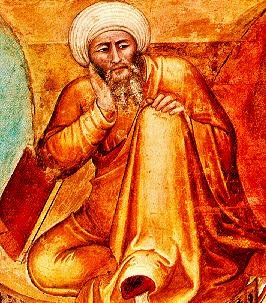 Listen to Melvyn Bragg's In Our Time on BBC Radio 4 this week discussing Averroes with Amira Benninson, Peter Adamson, and Sir Anthony Kenny.
Listen to Melvyn Bragg's In Our Time on BBC Radio 4 this week discussing Averroes with Amira Benninson, Peter Adamson, and Sir Anthony Kenny.Dante places Averroes last in a long list of pagan philosophers who are in Inferno because they could not enjoy the Christian revelation. But they are in Limbo, a strange sort of stasis without pain, a middle existence of hope without hope: 'sanza speme vivemo in disio' (Inf. 4. 42). Averroes' name appears with Aristotle's as bookends to a long catalogue of philosphers. Aristotle is the 'maestro di color che sanno', and Averroes is he 'che 'l gran comento feo', that is, he who produced the celebrated Aristotelian commentary. The influence of Averroes' thought in Duecento-Trecento Italian poetry is much debated, especially how and in exactly what way it influenced the dolce stil nuovo and in particular Guido Cavalcanti. Cavalcanti is the great unspoken character in the Commedia, once Dante's primo amico, the only trace of him appears in Inf. 10 where his father asks movingly: 'mio figlio ov'è? e perché non è teco?' (l. 60). Dante's reply has been explained in various ways, and remains ambiguous and strange: 'Da me stesso non vegno: | colui ch'attende là, per qui mi mena | forse cui Guido vostro ebbe a disdegno' (61-3).
2 comments:
Have you ever seen Anthony Kenny around town?
I haven't really, but I presume he's in and out of Balliol. You should ask Mary, I'm sure she's spotted the great man.
Post a Comment